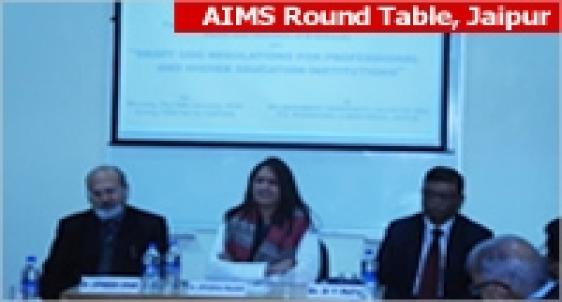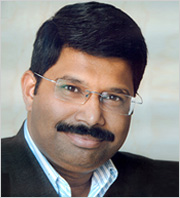
In the backdrop of the controversy related to the UGC draft Guidelines vis a vis technical institutes, Association of Indian Management Schools (AIMS) organized a Round Table of Deans and Directors of B-Schools on “Draft UGC Regulations for Professional and Higher Educational Institutions” on Monday, January 20, 2014 at JK Lakshmipat University, Jaipur.
The Round Table was attended by 37 deans & directors of various B-Schools including their nominees and some faculty members. Dr Upinder Dhar, Regional Vice President (North) and Vice Chancellor JK Lakshmipat University, Jaipur delivered the welcome address in which he raised concerns on the Notification from UGC and the Supreme Court’s judgments in the said context.
In an order passed dated January 16, 2014, The Supreme Court of India had asked the AICTE to continue as a regulatory body for the PGDM institutions.
In the latest development bringing relief to 280 odd PGDM Institutes, All India Council for Technical education (AICTE) had announced on January 24 regarding opening the window for approval of all matters related to existing PGDM institutions including the increase in intake, and extension of approval.
Dr Apoorva Palkar President, AIMS apprised the audience about the aftermath of the Supreme Court judgment of April 2013. She briefed the audience about the case filed by AIMS and others challenging AICTE’s involvement in taking decisions related to fee, curriculum and other governance issues for PGDM programme. She also updated the audience about the current status of PGDM programme wherein the programme will continue to run under the purview of AICTE for the academic year 2014-15. She also touched upon the issue of equivalence of PGDM programme to MBA by AIU.
Dr DY Patil, the immediate former president of AIMS briefly emphasized the need for a third party regulator which is free from political interferences.
Dr H Chaturvedi, Alternate President EPSI and Director BIMTECH, Greater Noida was critical in his introductory remarks about the failure of UGC to provide complete information and sufficient timeframe for seeking comments and suggestions from the various stakeholders. He added that most of the points in the draft regulations have been taken verbatim from the AICTE’s Handbook of Approval Processes for 2012-13. Dr Chaturvedi also pointed at the other issues in management education, such as over-supply, lack of quality and low employability of management graduates. Though he said that a legal entity for regulating is essential for developing trust among the aspiring candidates, he advocated that the institutes should be granted full autonomy in the matters related to fee, curricula and examinations among others. He emphasized that viewpoints of representative bodies of recruiters like FICCI, ASSOCHAM, CII and NASSCOM also needs to be taken into consideration while charting out a plan for MBA education for next 10 years.
Dr Ashok Bapna, Advisor IILM and Member – State Planning Board, Govt of Rajasthan, highlighted the need for sensitizing and creating pressure on the government through coordinated efforts. He insisted that the concern for quality should be louder instead of pondering over the issue of regulator.
Dr Prabhat Pankaj, Director, JIM, Jaipur suggested to have a multipronged strategy for achieving transformational effect of management education. He advocated the need for accreditation.
Mr Amit Agnihotri, Chairman, MBAUniverse.com shared the data related to number and types of management institutes in India. He further added that the long term perspective on management education is missing altogether. He also said that positive lobbying is needed for improving the regulatory framework. Mr Agnihotri advocated for innovation in curricula and admissions.
The round table was followed by an open discussion round in which various speakers expressed their ideas.
Dr Rakesh Khurana, former pro VC of IGNOU and Chairman Network India stated that the management educators and administrators themselves are responsible for making the resolution process mediated by courts of law. He emphasized upon the need of having self-regulatory institutions.
Dr Swapan Kumar Majumdar, Director, Institute of Management, JK Lakshmipat University, Jaipur suggested to undertake a root cause analysis of the issue. He added that the third party regulator should be free from all political and economic interests.
Prof Rajesh Kothari, University of Rajasthan, Jaipur indicated that we do not need regulators and the institutes should be allowed to be market driven. He added that institutes offering management programmes should have a societal orientation along with local adaptation.
Prof Prabir Pal, former President of AIMS shared the statistics about management and engineering institutes running in the country. He further added that most of the institutes welcomed the step of disassociation of MBA programme from AICTE.
Dr Upinder Dhar, Vice-Chancellor, JK Lakshmipat University, Jaipur proposed that there should be an apex body for regulating management education in the country. The body may be called “All India Council for Management Education” (AICME). Dr Dhar’s proposal was backed by Prof. HK Maram, Regional Vice President of AIMS (South) who suggested that such a body can be formed on the lines of Pharmaceutical Council of India (PCI) and Bar Council of India (BCI).
Prof. Rakesh Khurana suggested that the time has come to regard management as a profession with its own code of conduct. He further added that having such an apex body for regulating management education will require a lot of political capital and the same should be a statutory council.
Prof Ajit Singh, regional vice president (West) highlighted the need for consolidation of efforts from different regions to create a visible impact.
Prof S Sarkar, member of the executive board of AIMS emphasized that equivalence of PGDM with MBA programme should be done at a higher level instead of individual institutes approaching AIU for the same.
MBAUniverse.com readers will remember that on December 5, 2013 the UGC had stirred the hornets’ nest by announcing new “draft guidelines” to regulate thousands of technical colleges including engineering and management schools in the country. As per the guidelines, Independent B-Schools which follow their own curriculum and set their own course fees, were also required to obey the guidelines and seek affiliation to universities that function under the UGC and adopt their syllabus.
| Our Earlier Articles on UGC |
UGC Draft Guidelines: Supreme Court asks AICTE to remain the regulatory body to the PGDM Institutes
UGC Revised Guidelines include PGDM too; encroach on autonomy, fee, admissions
UGC draft guidelines: "UGC Draft Guidelines not applicable to PGDM B schools"
EPSI meets Pallam Raju; MHRD extends UGC deadline on Tech Education
UGC Guideline: AIMS, FAMPEI join EPSI & B-school Association to oppose
UGC guidelines for technical Institutes; Impact on PGDM unclear
UGC Guidelines: EPSI & Business Schools Association object; fear negative impact on PGDM
UGC draft guidelines: EPSI to organize meeting with PGDM B Schools heads in New Delhi on Dec 28
Click here to score high marks in GD PI WAT at Top B school for Admission 2014:
http://www.mbauniverse.com/gd_pi_preparation/gd_preparation.php
|
Click below to know the list of top B schools for MBA Admission 2014 |
||
Click here to score high marks in GD PI WAT at Top B school for Admission 2014:
http://www.mbauniverse.com/gd_pi_preparation/gd_preparation.php
MBAUniverse.com offers a comprehensive preparation package coupled with over 200 online interactive classes with Top CAT experts including from IIMs for CAT 2014 preparation. Visit the link below for more information and new batch schedules:
http://www.mbauniverse.com/mba-exam-preparation/CAT_Preparation/mba_preparation_package.php
IIM Admission Criteria 2014-16
- IIM Ahmedabad Admission criteria 2014-16
- IIM Bangalore Admission Criteria 2014-16
- IIM Calcutta Admission Criteria 2014-16
- IIM Lucknow Admission Criteria 2014-16
- IIM Kozhikode Admission Criteria 2014-16
- IIM Indore Admission Criteria 2014 - 16
- IIM Shillong Admission Criteria 2014-16
Six New IIMs
- IIM Tiruchirappalli Admission Criteria 2014-16
- IIM Ranchi Admission Criteria 2014
- IIM Rohtak Admission Criteria 2014
- IIM Kashipur Admission Criteria 2014-16
- IIM Raipur Admission Criteria 2014-16
- IM Udaipur Admission Criteria 2014-16
| Solved WAT Essay topic for Admission 2014 |
WAT Topic for MBA: 2014 General elections will be a watershed for Indian democracy
WAT Topic for MBA: Corruption is the root cause of current economic and social woes in India
WAT Topic for MBA: India`s 1.2 billion population is an asset for the country
WAT Topic for MBA: India has more skilled Human Resource
WAT Topic for MBA: Indo-US relations; how much beneficial for India
WAT Topic for MBA: FDI in multi brand retail is a boon or bane
WAT Topic for MBA: Is ASEAN a defunct Group
WAT Topic for MBA: Essay writing; fasten your belts
Essay Writing and WAT in IIMs: Role, Importance and Weightage
Click for more WAT topics for MBA
| Solved GD Topics for MBA Admission 2014 : |
GD Topic for MBA: What India gained at the WTO DOHA Round
GD topic for MBA: Political activism is the only way to root out corruption
GD Topic for MBA: New Lokpal will be effective in curbing corruption
GD Topics: Gender bias in portraying Women in Advertisements
GD Topic for MBA: RBI's new governor has taken adequate steps to improve Indian Economy
GD Topic for MBA: Corruption is the root cause for Indian Economy slowdown
GD Topic for MBA: The rise in vegetable prices is a man made farce
GD Topic for MBA: Opinion Polls be banned in pre election period
GD Topic for MBA: Should business lobbying be made legal in India?
GD Topics: Will India remain way behind China?
|
For any doubts and queries related to the exam pattern, preparations and other related queries about MBA entrance exams like XAT,IIFT, NMAT, SNAP, CMAT, IBSAT, MICAT and MBA Admission 2014, click here http://www.mbauniverse.com/mbau_faq/client.php |
MBAUniverse.com will keep you updated on this important development. Stay tuned.



























